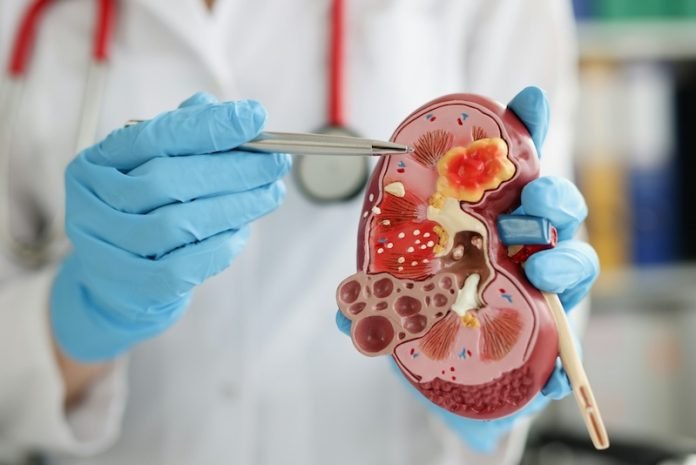
Diabetic nephropathy, a significant complication of diabetes, is the leading cause of kidney disease in patients starting renal replacement therapy, including dialysis and kidney transplantation.
Characterized by the damage diabetes causes to the kidneys, this condition sneaks up silently, often going unnoticed until it reaches more severe stages.
This review delves into the symptoms, stages, causes, and treatments of diabetic nephropathy, shedding light on this critical issue facing millions worldwide.
Understanding Diabetic Nephropathy
At its core, diabetic nephropathy is a form of chronic kidney disease (CKD) directly linked to both type 1 and type 2 diabetes.
Over time, high blood sugar levels associated with diabetes damage the kidneys’ delicate filtering system, leading to the leakage of proteins like albumin into the urine, a condition known as albuminuria.
As the disease progresses, it can lead to a decline in kidney function, eventually culminating in kidney failure.
Symptoms: The Silent Onset
One of the most challenging aspects of diabetic nephropathy is its silent onset. In its early stages, the condition typically presents no symptoms.
As it progresses, symptoms might include swelling in the feet and ankles, higher blood pressure, more frequent urination at night, and a need to urinate more or less often. Advanced stages can lead to more severe symptoms, including nausea, vomiting, loss of appetite, and a bad taste in the mouth.
Stages of Progression
The progression of diabetic nephropathy can be divided into five stages, starting from slight kidney damage with normal kidney function (stage 1) to kidney failure (stage 5). Early detection is crucial, as interventions in the initial stages can significantly slow the progression.
Causes: The Role of Diabetes
The primary cause of diabetic nephropathy is long-term uncontrolled diabetes. High blood sugar levels over time lead to damage in the nephrons, the tiny blood vessel clusters in the kidneys that perform the filtration.
Additionally, factors such as high blood pressure, smoking, and genetic predisposition can increase the risk of developing this kidney disease.
Treatment: Managing and Slowing Progression
There is no cure for diabetic nephropathy, but treatment focuses on slowing its progression and managing symptoms. Key strategies include:
- Controlling Blood Sugar: Tight management of blood sugar levels can slow the progression of kidney damage. This often involves medication, diet, exercise, and regular monitoring of blood glucose levels.
- Blood Pressure Management: High blood pressure accelerates kidney damage. Angiotensin-converting enzyme (ACE) inhibitors or angiotensin II receptor blockers (ARBs) are often prescribed to keep blood pressure in check.
- Dietary Changes: A diet low in protein, salt, and other kidney-stressing substances can help manage kidney function.
- Treatment of Complications: As the disease progresses, treatments may be needed for complications like high cholesterol, anemia, and bone health.
- Dialysis and Transplantation: In cases of kidney failure, dialysis or a kidney transplant may become necessary.
The Road Ahead: Research and Hope
Ongoing research is focused on finding new treatments and better understanding the mechanisms behind diabetic nephropathy. Innovations in medication, improved methods for early detection, and a deeper understanding of genetic factors offer hope for the future.
In conclusion, diabetic nephropathy represents a significant challenge for those living with diabetes. Its silent nature emphasizes the importance of regular check-ups and proactive management of diabetes and blood pressure.
Through early detection, lifestyle changes, and treatment, individuals can manage the effects of diabetic nephropathy, maintaining kidney function and quality of life for as long as possible.
Understanding this condition is crucial for patients, caregivers, and healthcare providers alike, as it underscores the interconnectedness of our body’s systems and the importance of comprehensive health management.
If you care about diabetes, please read studies that not all whole grain foods could benefit people with type 2 diabetes, and green tea could help reduce death risk in type 2 diabetes.
For more information about health, please see recent studies about unhealthy plant-based diets linked to metabolic syndrome, and results showing Mediterranean diet could help reduce the diabetes risk by one third.
Copyright © 2024 Knowridge Science Report. All rights reserved.



